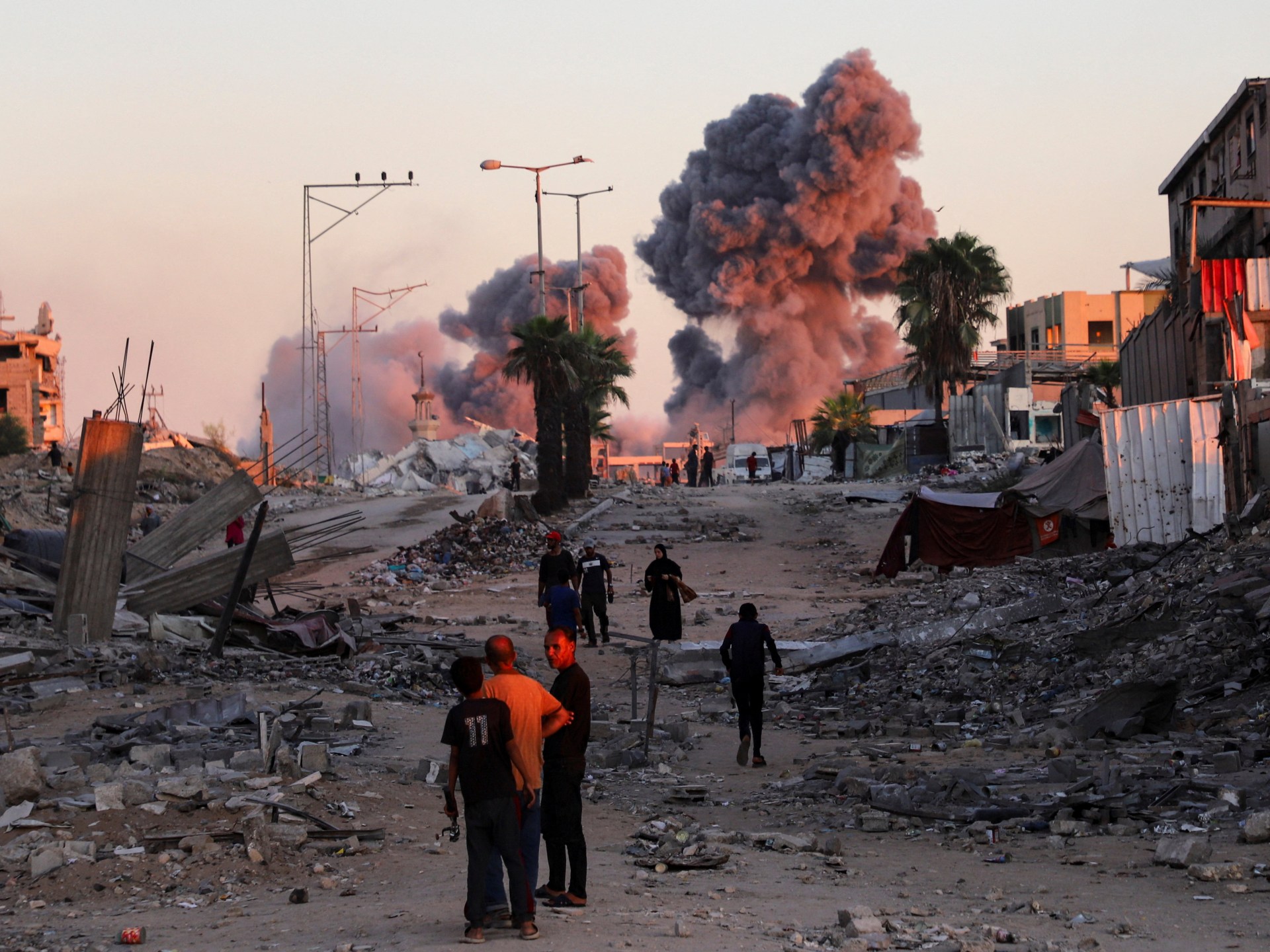United States President Donald Trump says indirect talks between Hamas and Israel over a potential ceasefire in the war on Gaza and an exchange of captives were going “very well” and that he may travel to the Middle East later this week.
Speaking to reporters at the White House on Wednesday, Trump said that a deal is “very close”.
Recommended Stories
list of 3 itemsend of list
“Negotiations are going along very well,” he said. “I may go there sometime toward the end of the week, maybe on Sunday,” he said.
Senior officials from Qatar, Turkiye, Egypt and the US joined the delegations in Egypt’s Red Sea resort of Sharm el-Sheikh on Wednesday, the third day of the talks, as the mediators pressed the two sides to resolve their differences over Trump’s 20-point proposal.
The first phase of the plan calls for a ceasefire and the release of 48 Israeli captives held in Gaza, including 20 who are believed to be alive, and the release of Palestinian prisoners held in appalling conditions in Israeli jails.
Hamas has submitted its list of detainees to be freed as part of the proposed swap.
Trump’s son-in-law, Jared Kushner, and special envoy Steve Witkoff, as well as Israeli Strategic Affairs Minister Ron Dermer – a close aide of Prime Minister Benjamin Netanyahu – were participating in the negotiations on Wednesday, Israeli and Palestinian sources said.
Also joining the discussions was the prime minister of longstanding key mediator Qatar, Sheikh Mohammed bin Abdulrahman bin Jassim Al Thani.
The Hamas delegation includes leaders Khalil al-Hayya and Zaher Jabarin, two negotiators who survived an Israeli assassination attempt in Qatar’s capital Doha that killed five people last month.
In a statement released late Wednesday, senior Hamas official Izzat al-Risheq said the group welcomes the participation of Qatar’s prime minister and Turkiye’s intelligence chief, alongside Egypt’s intelligence chief, in the current round of talks.
He said their involvement gives the negotiations “a strong boost” towards achieving positive results on ending the war and facilitating a prisoner exchange.
A delegation from the Palestinian Islamic Jihad (PIJ) armed group is also set to arrive in Egypt to participate in the indirect talks, according to a statement from the group.
The PIJ is the smaller of the two main Palestinian groups in the Gaza Strip and is currently holding some Israeli captives.
For his part, Turkish Foreign Minister Hakan Fidan said the mediated negotiations had made “a lot of headway” and that a ceasefire would be declared if they reached a positive outcome.
Al Jazeera’s senior political analyst Marwan Bishara says the talks remain tense with “some serious disagreements”, as crucial details are yet to be hammered out – including the timing and the extent of an Israeli withdrawal, the makeup of the post-war administration for the Gaza Strip and the fate of Hamas.
“You could say that the initial phase of the initial phase is working out,” Bishara said. According to him, both sides appeared to agree on “some sort of parameters” for a captive-prisoner exchange.
“According to the plan, … after Hamas hands over the captives, then the war should be over,” Bishara said. “Israel says no, the war will be over only after Hamas disarms.”
Israeli attacks continue
Even as the talks progressed on Wednesday, Israel continued its attacks on Gaza. At least eight Palestinians were killed across Gaza over the previous 24 hours, the Palestinian Health Ministry said on Wednesday. At least 61 others were injured in attacks, it said.
Gaza’s Government Media Office said in a statement on Wednesday that Israel carried out 271 air and artillery strikes over the past five days despite calls from the US to stop the bombardment. The attacks targeted densely populated areas and shelters for displaced people across the enclave, killing 126 civilians, including women and children – with 75 of them in Gaza City alone.
Al Jazeera’s Tareq Abu Azzoum, reporting from central Gaza’s az-Zawayda, said the situation on the ground “looks extremely bleak” as Israeli drones are still targeting residential buildings, particularly in Gaza City.
“Civilians have said the scale of bombardment sounds less intense in comparison with the days preceding the onset of the current round of negotiations,” Abu Azzoum said.
“They say that might be a sign that mediators are exerting further pressure on Israel to at least mitigate the scale of its bombardment on Gaza for one reason: It’s to allow for Hamas fighters to retrieve bodies of Israeli captives as part of the first phase of the ceasefire deal,” he said.
Meanwhile, the World Health Organization (WHO) has warned that just 14 of Gaza’s 36 hospitals are partially functioning, and only a third of 176 primary care facilities work.
Hanan Balkhy, WHO regional director for the Eastern Mediterranean, said Gaza has been struggling with “dire shortages” of electricity, clean water and medicine, as well as broken equipment and damaged infrastructure in those health facilities still working.
“Some facilities have been hit and rehabilitated and hit once more,” she said.
Source: Aljazeera

Leave a Reply